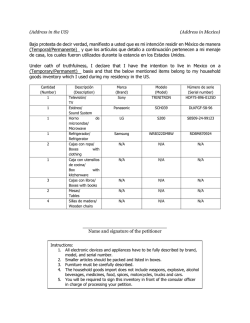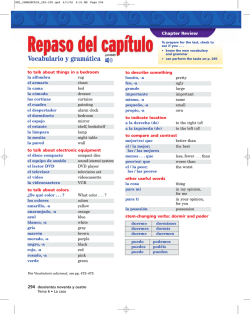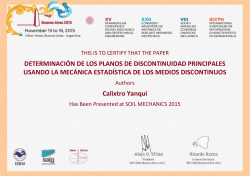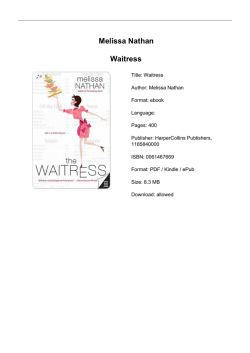
Responding to Post Election Uncertainty for Staff
Los Angeles Unified School District STUDENT HEALTH AND HUMAN SERVICES School Mental Health Responding to Post Election Uncertainty for Staff The recent election has triggered many strong emotions for staff, students, families and community members throughout the District and across the nation. As school personnel, we each play a critical role in promoting a sense of safety and healing the divisiveness that may permeate our schools and communities. For many students and families, the results have triggered feelings of concern, fear, anger, and sadness. As school personnel, there are strategies you can implement on a daily basis to ensure students are heard and feel protected during these uncertain times. LISTEN to what they say and how they act: •Ask your student how they are feeling in school or in the community since the presidential election. •Provide a designated time for open dialogue with ground rules for listening to one another and being respectful. •Pay attention to any behavioral changes in students; often students demonstrate their emotions in nonverbal ways. • Tell your students that you want to know if they are ever insulted, put-down, harassed, or bullied at school due to their race, ethnic, sexual orientation, or religious beliefs. PROTECT by maintaining structure, stability, and consistency: •Remind students that they are safe in school and they are safe in your classroom. •Be aware that alternatively, when student’s loved ones are also threatened, students may not feel safe. This sense of perceived danger can be alleviated by offering students an environment in the classroom that provides comfort, stability and predictability. •Some ways to protect students are to monitor conversations that may trigger fear or anxiety; encourage parents/guardians and student to limit use of technology, social media, television that may incite fears; provide accurate and age-appropriate information. •If a student says that they have experienced or witnessed any incident of harassment or bullying, believe them and report the incident immediately. •Develop a safety plan, if necessary. CONNECT through interaction, activities and resources: •A positive relationship with a healthy adult at home and at school is one of the most important factors that helps build an individual’s resilience. Having a sense that students and adults care about each other, individually and as a collective contributes to their social-emotional well-being, as well as their academic success. •“Check in” with students regularly. •Become familiar with the school and community resources available to support your students. SMH Clinics and Wellness Centers MODEL calm and optimistic behavior: North Valley Clinic 6651-A Balboa Blvd., Van Nuys 91406 Tel: 818-758-2300 | Fax: 818-996-9850 West Crenshaw Wellness Center 3206 W. 50th St., Los Angeles 90043 Tel: 323-290-7737 | Fax: 323-290-7713 Hyde Park Clinic 6519 S. 8th Ave., Bungalow #46, Los Angeles 90043 Tel: 323-750-5167 | Fax: 323-759-2697 Washington Wellness Center 1555 West 110th St., Los Angeles 90043 Tel: 323-241-1909 | Fax: 323-241-1918 South 97th Street School Mental Health Clinic Barrett Elementary School 439 W. 97th St., Los Angeles 90003 Tel: 323-418-1055 | Fax: 323-418-3964 San Pedro Clinic 704 West 8th St., San Pedro 90731 Tel: 310-832-7545 | Fax: 310-833-8580 • It is important that as school staff we use this as an opportunity to model what it looks like to hear one another’s views in a calm, optimistic manner, while respecting differing opinions. •Pay attention to your thoughts feelings and reactions about the election. Student’s take their cues from the adults they are with; pay attention to adult conversations happening in the presence of students. •Model healthy behaviors/responses by remaining calm, courteous and helpful. •Acknowledge that recent political developments may leave many feeling vulnerable and overwhelmed. The uncertainty may create feelings of desperation and hopelessness for the future. As school staff, it is important that we maintain calm and express optimism for the future. Allowing students to express themselves and feel empowered in their lives and the decisions they make are important, as well as communicating high expectation for their academic success and well-being. •Practice self-care, which includes getting help when needed, making sure to get enough sleep, eating healthy and maintaining an exercise regimen. Locke Wellness Center 316 111th St., Los Angeles 90061 Tel: 323-418-1055 | Fax: 323-418-3964 TEACH about normal changes that can occur when feeling nervous or upset: Carson Wellness Center 270 East 223rd St., Carson 90745 Tel: 310-847-7216 | Fax: 310-847-7214 East Bell/Cudahy School Mental Health Clinic Ellen Ochoa Learning Center 7326 S. Wilcox, Cudahy 90201 Tel: 323-271-3676 | Fax: 323-271-3657 Ramona Clinic 231 S. Alma Ave., Los Angeles 90063 Tel: 323-266-7615 | Fax: 323-266-7695 Gage Wellness Center •Each student will have a unique reaction to the same situation. •Teach students that speaking up and asking for help is a source of strength. It is important for students to develop and utilize their skills to overcome difficult situations by engaging in help-seeking behavior. •It is crucial that students understand that “if something unpredictable happens, I can count on my family and school to support and help me heal.” •Ask students to identify one adult at their school that they can ask for help if they experience harassment or bullying. 2880 Zoe Ave., Huntington Park 90255 Tel: 323-826-9499 | Fax: 323-826-1524 Elizabeth LC Wellness Center 4811 Elizabeth St., Cudahy 90201 Tel: 323-271-3676 | Fax: 323-271-3657 Central Belmont Wellness Center 180 Union Place, Los Angeles 90026 Tel: 213-241-4451 | Fax: 213-241-4465 Roybal Clinic 1200 West Colton St., Los Angeles 90026 Tel: 213-580-6415 | Fax: 213-241-4465 For clinic referrals visit: smh.lausd.net 333 S. Beaudry Avenue, 29th Floor | (213) 241.3841 | smh.lausd.net | ccis.lausd.net Los Angeles Unified School District STUDENT HEALTH AND HUMAN SERVICES School Mental Health Responding to Post Election Uncertainty for Parents/Caregivers The recent election has triggered many strong emotions for staff, students, families and community members throughout the District and across the nation. As adults and parents, we play a critical role in promoting a sense of safety and healing the divisiveness that may permeate our schools and communities. For many children and families, the results have triggered feelings of concern, fear, anger, and sadness. As parents and guardians, there are strategies you can implement on a daily basis to ensure your children are heard and feel protected during these uncertain times. LISTEN to what they say and how they act: •Ask your child how they are feeling in school or in the community since the presidential election. •Pay attention to any behavioral changes in your child; often children demonstrate their emotions in nonverbal ways. •Tell your child that you want to know about their day: if they are ever insulted, put-down, harassed, or bullied at school or in the community due to their race, ethnic, sexual orientation, or religious beliefs. PROTECT by maintaining structure, stability, and consistency: •Access to means (e.g., firearms, knives, medication) •Remind your child that you will protect them from any danger: physical, verbal, or emotional. •Be aware that alternatively, when children’s loved ones are also threatened, children do not feel safe. This sense of perceived danger can be alleviated by offering children comfort, stability and predictability. •Some ways to protect children are to monitor conversations that may trigger fear or anxiety; limit or monitor use of technology, social media, television that may incite fears; provide accurate and ageappropriate information. •If your child says that they have experienced or witnessed any incident of harassment or bullying, believe them and report the incident immediately. CONNECT through interaction, activities and resources: •A positive relationship with a healthy adult at home and at school is one of the most important factors that helps build an individual’s resilience. Having a sense that children and adults care about each other, individually and as a collective contributes to their social-emotional well-being, as well as their academic success. •“Check in” with your child regularly, before and after school. •Become familiar with the school and community resources available to support your child and family. •If your child shares that they were physically attacked, file a police report by calling 911, or call your local law enforcement office. To contact the Los Angeles School Police Department, call (213) 6256631. •If the incident takes place in school, inform the school Principal or speak to an employee at the main office to find someone to help you. SMH Clinics and Wellness Centers MODEL calm and optimistic behavior: North Valley Clinic 6651-A Balboa Blvd., Van Nuys 91406 Tel: 818-758-2300 | Fax: 818-996-9850 West Crenshaw Wellness Center 3206 W. 50th St., Los Angeles 90043 Tel: 323-290-7737 | Fax: 323-290-7713 Hyde Park Clinic 6519 S. 8th Ave., Bungalow #46, Los Angeles 90043 Tel: 323-750-5167 | Fax: 323-759-2697 Washington Wellness Center 1555 West 110th St., Los Angeles 90043 Tel: 323-241-1909 | Fax: 323-241-1918 South 97th Street School Mental Health Clinic Barrett Elementary School 439 W. 97th St., Los Angeles 90003 Tel: 323-418-1055 | Fax: 323-418-3964 San Pedro Clinic 704 West 8th St., San Pedro 90731 Tel: 310-832-7545 | Fax: 310-833-8580 Locke Wellness Center 316 111th St., Los Angeles 90061 Tel: 323-418-1055 | Fax: 323-418-3964 Carson Wellness Center 270 East 223rd St., Carson 90745 Tel: 310-847-7216 | Fax: 310-847-7214 East Bell/Cudahy School Mental Health Clinic Ellen Ochoa Learning Center 7326 S. Wilcox, Cudahy 90201 Tel: 323-271-3676 | Fax: 323-271-3657 Ramona Clinic 231 S. Alma Ave., Los Angeles 90063 Tel: 323-266-7615 | Fax: 323-266-7695 Gage Wellness Center 2880 Zoe Ave., Huntington Park 90255 Tel: 323-826-9499 | Fax: 323-826-1524 •It is important that as adults we use this as an opportunity to model what it looks like to hear one another’s views in a calm, optimistic manner, while respecting differing opinions. •Pay attention to your thoughts feelings and reactions about the election. Children take their cues from the adults they are with; pay attention to adult conversations happening in the presence of children. •Model healthy behaviors/responses by remaining calm, courteous and helpful. •Request a meeting with the Principal or designee if you have questions on how your child’s school is handling bullying, harassment, discrimination and/or any other threatening incidents towards students due to their race, ethnic, sexual orientation, or religious beliefs. •Acknowledge that recent political developments may leave many feeling vulnerable and overwhelmed. The uncertainty may create feelings of desperation and hopelessness for the future. As adults, it is important that we maintain calm and express optimism for the future. Allowing children to express themselves and feel empowered in their lives and the decisions they make are important, as well as communicating high expectation for their academic success and wellbeing. •Practice self-care, which includes getting help when needed, making sure to get enough sleep, eating healthy and maintaining an exercise regimen. TEACH about normal changes that can occur when feeling nervous or upset: •Each child will have a unique reaction to the same situation. •Teach your child that speaking up and asking for help is a source of strength. It is important for children to develop and utilize their skills to overcome difficult situations by engaging in help-seeking behavior. •It is crucial that children understand that “if something unpredictable happens, I can count on my family and school community to support and help me heal.” Ask your child to identify one adult at their school that they can ask for help if they experience harassment or bullying. Elizabeth LC Wellness Center 4811 Elizabeth St., Cudahy 90201 Tel: 323-271-3676 | Fax: 323-271-3657 Central Belmont Wellness Center 180 Union Place, Los Angeles 90026 Tel: 213-241-4451 | Fax: 213-241-4465 Roybal Clinic 1200 West Colton St., Los Angeles 90026 Tel: 213-580-6415 | Fax: 213-241-4465 For clinic referrals visit: smh.lausd.net 333 S. Beaudry Avenue, 29th Floor | (213) 241.3841 | smh.lausd.net | ccis.lausd.net Los Angeles Unified School District STUDENT HEALTH AND HUMAN SERVICES School Mental Health Respuesta a la Incertidumbre Post-Electoral para Padres/ Tutores Legales La reciente elección ha provocado muchas emociones fuertes para el personal, los estudiantes, las familias y los miembros de la comunidad en todo el Distrito y en toda la nación. Como adultos y padres, jugamos un papel crítico promover seguridad en poder remendar la división que puede permear en nuestras escuelas y comunidades. Para muchos niños y familias, los resultados han causado sentimientos de preocupación, miedo, ira y tristeza. Como padres y tutores, hay estrategias que puede implementar diariamente para asegurar que sus hijos sean escuchados y se sientan protegidos durante estos tiempos inciertos. ESCUCHE lo que dicen y cómo actúan: •Pregúntele a su hijo/a cómo se siente en la escuela o en la comunidad desde la elección presidencial. •Preste atención a cualquier cambio de comportamiento en su hijo/a; recuerde que a veces los niños demuestran sus emociones en formas no verbales. •Dígale a su hijo/a que desea saber acerca de su día: si en alguna vez lo insultan, lo molestan en la escuela o en la comunidad debido a su raza, su origen étnico, su orientación sexual o sus creencias religiosas. PROTEJA manteniendo la estructura, estabilidad y consistencia: •Recuérdele a su hijo/a que lo protegerá de cualquier peligro: físico, verbal o emocional. •Tenga en cuenta que cuando los seres queridos de los niños también están amenazados, los niños no se sienten seguros. Esta sensación de peligro puede mejorar al ofrecerles a sus hijos comodidad, estabilidad y predictibilidad. •Algunas maneras de proteger a los niños es en monitorear las conversaciones que pueden provocar miedo o ansiedad; Limitar o monitorear el uso de la tecnología, los medios sociales, la televisión que pueden incitar temores; Proporcionar información cierta y apropiada para la edad. •Si su hijo/a dice que ha experimentado o ha sido testigo de cualquier incidente de acoso o intimidación, cree en ellos e informe inmediatamente el incidente. CONECTE a través de la interacción, las actividades y los recursos: •Una relación positiva con un adulto sano en casa y en la escuela es uno de los factores más importantes que ayuda a construir la resiliencia de un individuo. Sentir de que los niños y los adultos se preocupan unos por otros, individualmente y como grupo contribuye a su bienestar social-emocional, así como su éxito académico. •Hable con su hijo/a regularmente, antes y después de la escuela. •Familiarícese con los recursos escolares y comunitarios disponibles para apoyar a su hijo/a y su familia. •Si su hijo/a le comenta que fue atacado/a físicamente, llame al 911 o llame a la oficina local de policía. •Para comunicarse con el Departamento de Policía de la Escuela de Los Ángeles, llame al (213) 625-6631. • Si el incidente ocurrió en la escuela, informe al Director/a de la escuela o hable con un empleado en la oficina principal. Clínicas de Salud Mental y Centros de Bienestar Norte Clínica del Valle 6651-A Balboa Blvd., Van Nuys, 91406 Tel: 818-758-2300 | Fax: 818-996-9850 Oeste Centro de Bienestar de Crenshaw 3206 W. 50th St., Los Ángeles, 90043 Tel: 323-290-7737 | Fax: 323-290-7713 Clínica de Hyde Park 6519 S. 8th Ave., Bungalow #46, Los Ángeles, 90043 Tel: 323-750-5167 | Fax: 323-759-2697 Centro de Bienestar de Washington 1555 West 110th St., Los Ángeles, 90043 Tel: 323-241-1909 | Fax: 323-241-1918 Sur Clínica de la Calle 97 Escuela Primaria de Barrett 439 W. 97th St., Los Angeles, CA 90003 Tel: 323-418-1055 | Fax: 323-418-3964 Clínica de San Pedro 704 W. 8th St., San Pedro, 90731 Tel: 310-832-7545 | Fax: 310-833-8580 Centro de Bienestar de Locke 316 111th St., Los Ángeles, 90061 Tel: 323-418-1055 | Fax: 323-418-3964 Centro de Bienestar de Carson MODELE calma y comportamiento optimista: •Es importante que como adultos usemos estas oportunidades para modelar los puntos de vista que escuchamos de los demás en una manera tranquila y optimista, y a la misma vez respetando las opiniones diferentes. •Preste atención a sus pensamientos, sentimientos y reacciones sobre la elección. Sus hijos aprenden de sus señales y reacciones; Preste atención a las conversaciones de adultos que ocurren en presencia de ellos. •Modele reacciones saludables manteniendo la calma, siendo cortés y útil. •Pida una junta con el Director/a o persona designada si tiene preguntas sobre cómo la escuela de su hijo/a está manejando el acoso, la discriminación y / o cualquier otro incidente amenazante hacia su hijo/a debido a su raza, origen étnico, orientación sexual o creencias religiosas. •Reconozca que los recientes acontecimientos políticos pueden hacer que muchos se sientan vulnerables y abrumados. La incertidumbre puede crear sentimientos de desesperación y desesperanza para el futuro. Pero como adultos, es importante mantener la calma y expresar optimismo. Permita que sus hijos se expresen y se sientan empoderados en sus vidas y que sepan que las decisiones que toman son importantes, y a la misma vez comuníqueles las altas expectativas que tienen para su éxito académico y bienestar. •Practique el autocuidado, que incluye obtener ayuda cuando sea necesario, asegurarse de dormir lo • suficiente, comer sano y mantener un régimen de ejercicios. 270 E. 223rd St., Carson, 90745 Tel: 310-847-7216 | Fax: 310-847-7214 ENSEÑE acerca de los cambios normales que Este Clínica de Bell/Cudahy Centro de Aprendisaje Ellen Ochoa 7326 S. Wilcox, Cudahy, CA 90201 Tel: 323-271-3676 | Fax: 323-271-3657 Clínica de Ramona 231 S. Alma Ave, Los Ángeles, 90063 Tel: 323-266-7615 | Fax: 323-266-7695 Centro de Bienestar de Gage 2975 Zoe Ave., Huntington Park, 90255 Tel: 323-826-9499 | Fax: 323-826-1524 Centro de Bienestar de Elizabeth LC 4811 Elizabeth St., Cudahy, 90201 Tel: 323-271-3676 | Fax: 323-271-3657 pueden ocurrir cuando alguien se siente nervioso o molesto: •Cada niño tendrá una reacción única a la misma situación. •Enseñe a su hijo/a que hablar y pedir ayuda es una fuente de fuerza. Es importante que los niños desarrollen y utilicen sus habilidades para superar situaciones difíciles y buscar ayuda cuando lo sea necesario. •Es crucial que los niños entiendan que “si algo impredecible sucede, puedo contar con mi familia y comunidad escolar para que me apoyen y me ayuden a sanar”. •Pídale a su hijo/a que identifique a un adulto en su escuela en cual pueda pedir ayuda si experimenta hostigamiento o intimidación. Centro Centro de Bienestar de Belmont 180 Union Place, Los Ángeles, 90026 Tel: 213-241-4451 | Fax: 213-241-4465 Clínica de Roybal 1200 W. Colton St., Los Ángeles, 90026 Tel: 213-580-6415 | Fax: 213-241-4465 Para referencies para la clínica de salud mental, visite: smh.lausd.net 333 S. Beaudry Avenue, 29th Floor | (213) 241.3841 | smh.lausd.net | ccis.lausd.net
© Copyright 2026







